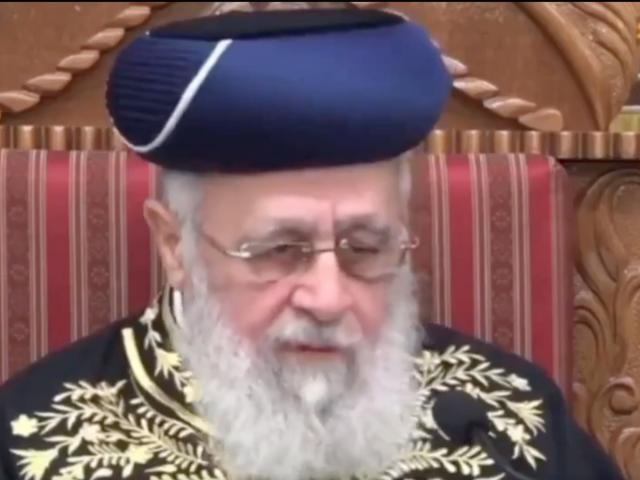In a recent development that has stirred significant controversy within Israeli society, Chief Sephardic Rabbi Yitzhak Yosef delivered a powerful message that has echoed across the nation's religious and secular divide. Addressing the contentious issue of military service for the ultra-Orthodox Jews, or Haredim, Rabbi Yosef issued a stark warning: should the Haredi community be compelled to serve in the Israeli Defense Forces (IDF), it could lead to a mass departure from the country.
Israeli Television's Channel 12 News captured Rabbi Yosef's emphatic words: “If they force us to join the army, we would all fly out of the country, buy tickets, and go.” His message was clear and underscored a deep-rooted concern for the preservation of Haredi religious values and lifestyle, which prioritizes Torah study over military service. Rabbi Yosef further cautioned, “They have to understand this, all those secularists, they don’t get it,” highlighting a perceived lack of understanding from secular Israelis about the essential role of Torah study in the nation's success and security. He firmly stated, “it puts the state at stake,” and elaborated, “They have to understand that without the Torah, without kollels and yeshivas, the army would not be successful.”
Chief Rabbi of Israel, Yitzhak Yosef, threatens to leave the country if the government forced him and his followers into military service:
— M e d i a s e t * S * (@MediasetS1) March 10, 2024
"Those who are exempted from military service will not go to military service under any circumstances, no matter what happens, if they force… pic.twitter.com/jKJwz6Zzyh
This standpoint reflects the ultra-Orthodox community's longstanding position on military service. Traditionally, Haredi Jews have been exempt from serving in the IDF, choosing instead to devote themselves to religious study in yeshivas. This exemption, however, has been a source of contention within Israeli society, particularly among those who view military service as a universal responsibility.
The debate intensified with comments from Israeli opposition leader Yair Lapid, who questioned the feasibility of Rabbi Yosef's threat, pointing out the challenges the ultra-Orthodox might face in adapting to life outside Israel, where community support structures differ significantly. Lapid emphasized the potential benefits of integrating Haredi youths into the IDF, stating, “if 66,000 Haredi youths enlist, the IDF will receive 105 new battalions essential for Israel’s security.” He also criticized Rabbi Yosef’s statement as “an insult and disgrace to the IDF soldiers who risk their lives to defend the country.”
Responding to Haredi leaders saying they will leave the country if the government begins to draft Haredim to the army, @yairlapid responds: "If Haredim go abroad they’ll find they have to work for a living." 🔥🔥🔥
— Aviva Klompas (@AvivaKlompas) March 10, 2024
The controversy has drawn reactions from various political figures, each offering their perspective on the matter. Israeli War Cabinet Minister Benny Gantz described Rabbi Yosef's words as a “moral affront to the state and Israeli society,” advocating for universal participation in national defense. On the other hand, Israeli National Security Minister Itamar Ben-Gvir argued against coercion, suggesting that understanding and love could resolve much of the controversy, possibly through enlistment in the police and national guard.
Avigdor Liberman, chairman of Yisrael Beytenu, and Education Minister Yoav Kisch also weighed in, emphasizing the responsibilities that accompany the rights of living in Israel and the privilege of serving in its defense forces.
There was no one to defend the Mir and Ponevezh in Europe, but now that they are in Israel there are.
— Chaya חיה 🇮🇱🌻🎗 (@chayarivka) March 9, 2024
More people are needed for the army else we will be having to rebuild these dynasties & yeshivas from the beginning all over again.
& that's only if we have the זכות. pic.twitter.com/uY4USMeroj
Despite the criticism, support for Rabbi Yosef's stance came from within the Haredi community, notably from the Sephardic haredi Shas Party, which defended the right of Torah scholars to prioritize religious study. The party criticized those opposing judicial reform for lacking moral standing to critique Rabbi Yosef's position.
The Israel Democracy Institute reported in a new poll that approximately 70% of Israel's Jewish population believes that the current exemption from IDF service for haredim needs to change. https://t.co/dTvCU8o8hl
— Avraham Israeli Zionist 🇮🇱🇨🇦 (@IsraeliAvraham) March 10, 2024
This heated debate highlights the complex interplay between duty, belief, and identity in Israeli society. It underscores the ongoing challenge of balancing the sacred right of religious study with the equally sacred duty of defending the nation, a dilemma that continues to shape the discourse on national service and societal cohesion in Israel.


